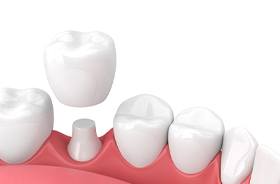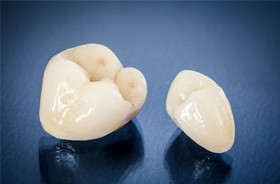Dental Crowns – Plymouth, MA
Protect and Restore Weakened Teeth
Dental crowns have been used for generations to help patients avoid extractions and retain their natural teeth. Today’s crowns are more comfortable, functional, and aesthetically pleasing than ever before. At Aveni Dental Professionals, we are proud to offer this restorative treatment. If you ever suspect that you need a crown, or one of your old crowns needs to be replaced, contact our team to schedule a consultation with Dr. Aveni.
Why Choose Aveni Dental Professionals for Dental Crowns?
- 1 Dentist with 40+ years of experience
- 2 Metal-free crowns available
- 3 Personalized, caring treatment
What Are Dental Crowns?

A typical dental crown is a custom-made restoration that covers the entire visible portion of the tooth — everything that you normally see above the gum line. In most cases, a crown’s purpose is to help a weakened tooth regain its structure and function. Often, a crown, along with other treatments, can even save a damaged tooth from extraction. Crowns can be used to achieve other objectives as well. For example, they can support a dental bridge in order to replace a lost tooth. Some patients choose to receive a crown for purely cosmetic reasons.
Crowns can be constructed out of a broad range of materials, including gold, silver, and other metals. For patients who prefer a more natural-looking solution, we usually recommend porcelain-fused-to-metal crowns or 100 percent porcelain crowns. The type of crown that is best for you will depend on the location of the tooth being treated, whether you struggle with teeth grinding, and your personal preference.
Why Might I Need a Crown?

You might need a crown if:
- You have a tooth that has been treated with root canal therapy
- One of your teeth is so badly decayed that a regular filling cannot restore it
- You have cracked tooth syndrome
- You are missing a tooth and wish to replace it with a bridge or dental implant
- You want to improve the appearance of a misshapen tooth
- A misshapen tooth is negatively affecting the way your bite functions
- One of your old crowns is no longer functional, or you want to replace it with something more natural-looking
The Crown Process

The process of placing a dental crown usually takes two appointments. At the first appointment, we prepare the tooth. Often, this requires that we file the tooth down or fill it in so it will fit well beneath its crown. Patient comfort is one of our top priorities, so you should feel little to nothing during this part of your treatment. Once the tooth is ready, we take an impression of it and the surrounding teeth. Dr. Aveni sends that impression, along with detailed notes, to a dental laboratory, which will get to work on creating a custom crown.
You will wear a temporary restoration to protect your tooth while the lab creates your permanent one. Once your crown is ready, you will return to our office. After Dr. Aveni verifies its fit, he will attach it to your tooth.
Dental Crowns FAQs

The team at Aveni Dental Professionals is eager to help you experience the many benefits of dental crowns. Before you book your restorative consultation, though, you might want to learn more about this treatment and what it involves. Of course, you are welcome to ask lots of questions when you visit us in-person. In the meantime, we invite you to take a look at the following list of dental crowns FAQs.
Are Dental Crowns Permanent?
Crowns are permanent in a sense. The preparation process requires that we significantly modify the underlying tooth. The enamel that we remove will never grow back on its own. Therefore, the tooth will always need a crown to protect it.
However, you cannot expect a crown to last forever. On average, they endure for 10 – 15 years before replacement becomes necessary. You can help your crown to stand the test of time by sticking to a good oral hygiene routine, eating a reasonable diet, and taking other practical measures.
How Do You Know When a Dental Crown Needs to Be Replaced?
Here are some indications that you should visit a dentist so they can assess your dental crown:
- The crown feels loose.
- There are visible signs of damage or wear on the crown.
- You are dissatisfied with the way the crown looks.
- You are experiencing sensitivity or pain in the tooth beneath your crown or in the surrounding tissues.
- The crown feels unstable or is interfering with your ability to comfortably bite down.
- You have a porcelain-fused-to-metal crown that has developed a dark line at its base.
During your appointment, your dentist will let you know for sure whether the crown needs to be replaced.
Do Dental Crowns Get Cavities?
A dental crown cannot get cavities, but the tooth beneath it remains vulnerable to decay. In fact, a crowned tooth has roughly the same risk of decay as an uncrowned one.
Poor oral hygiene is a major risk factor for decay in a crowned tooth; plaque can form along the gumline and eventually sneak beneath the crown, where it can attack the underlying dental structure. Thorough oral hygiene and regular dental visits can reduce the risk that you will develop cavities on any of your teeth, including those that have crowns.
Do Dental Crowns Feel Natural?
When you first receive your crown, it might feel strange in your mouth, and you might notice that it has a slightly different texture than the rest of your teeth when you run your tongue over it. Once you adapt to your crown, however, it should feel like a natural extension of your body. You might even forget that you have it! This is especially true with well-made crowns that are precisely crafted to fit in well with your natural occlusion (the way your upper and lower teeth fit together).
